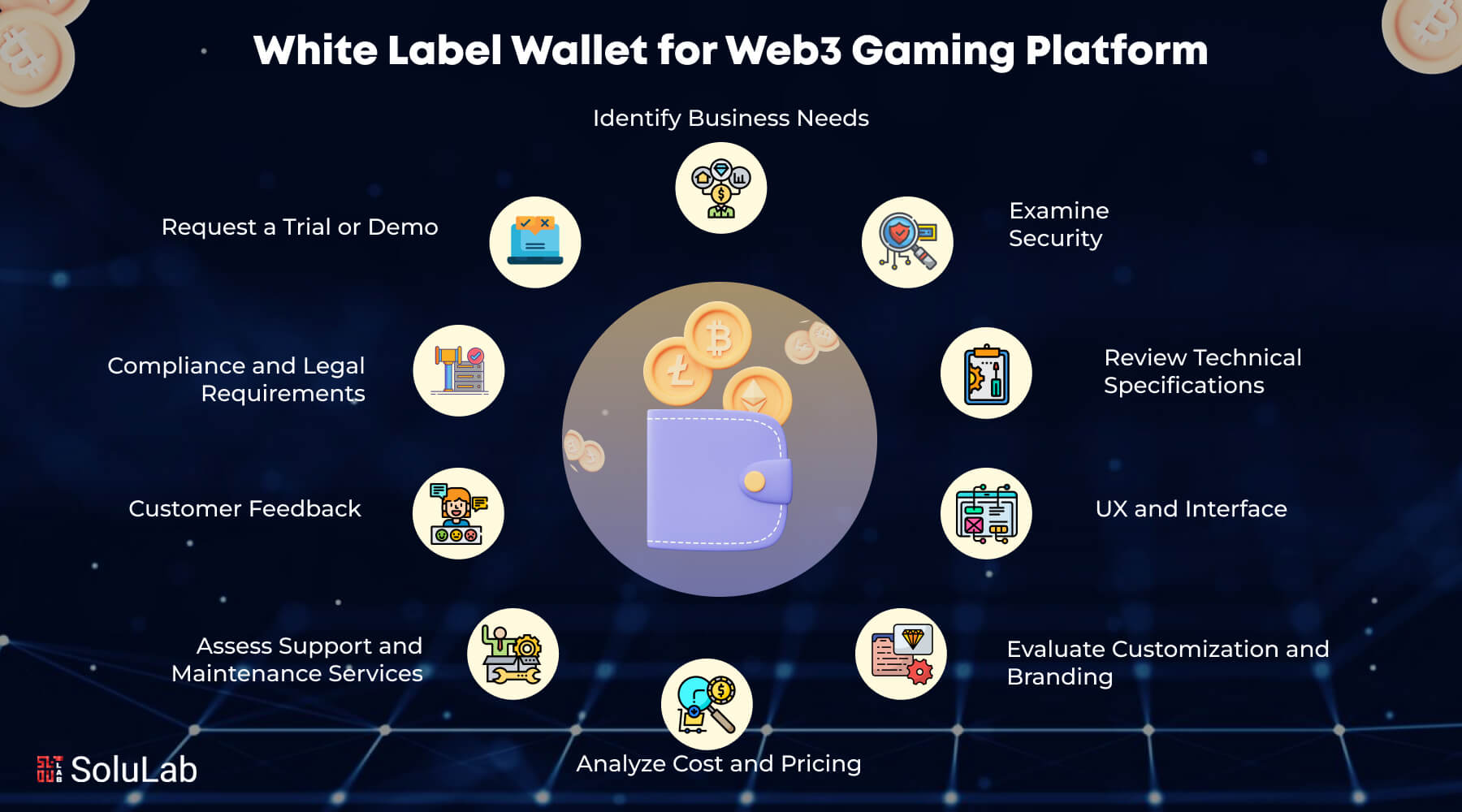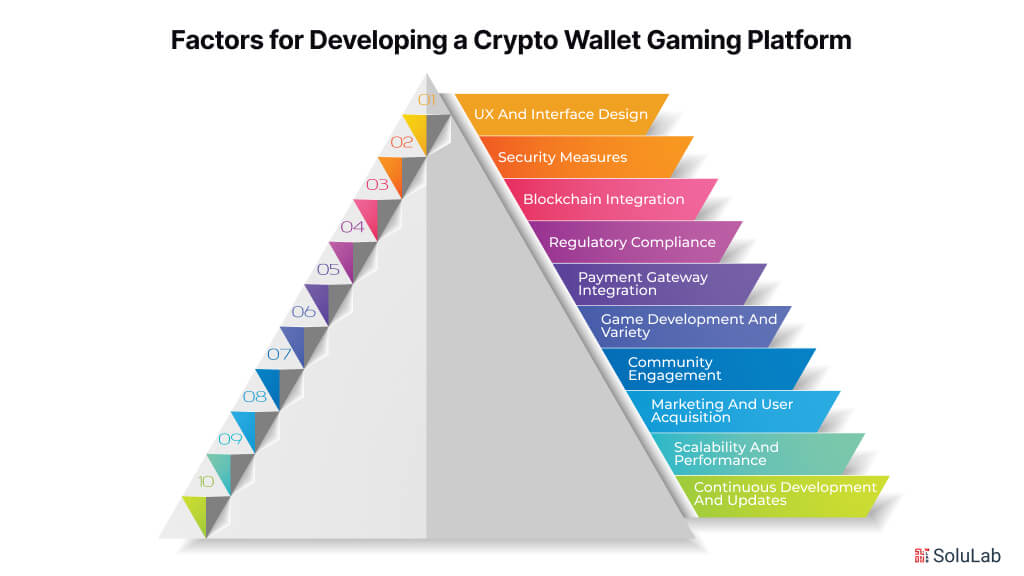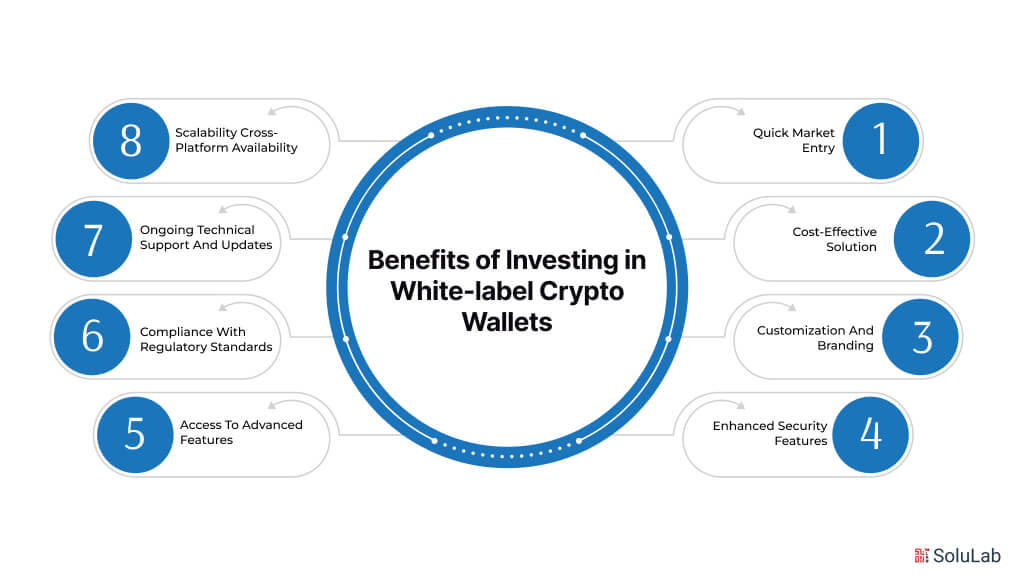
By giving players total control over in-game materials and the ability to change the course of projects, the Web3 gaming market broadens the scope of traditional gaming creation. Companies and project owners must select the best white-label crypto wallet solution to protect assets, improve player experience, and advance in the gaming industry. The gaming crypto wallet stats indicate that the Web3 gaming industry is experiencing unprecedented growth, with projections estimating the market to reach over $5 billion by 2027.
As blockchain technology improvizes gaming, developers and platforms seek efficient ways to integrate cryptocurrency functionalities. Implementing a white-label wallet solution offers a streamlined approach to providing users with secure and customizable digital wallets. This guide explores the essential factors to consider when selecting the ideal white-label wallet for your Web3 gaming platform, ensuring seamless integration and enhanced user experience.
The blog is a detailed reference for game creators and project owners, designed to assist them in making informed decisions. It has also been curated to guarantee that the Web3 white-label wallet gaming platform solutions suit your company’s requirements and goals.
What are White-Label Wallets?
White-label wallets offer a flexible and customizable solution for businesses aiming to provide secure cryptocurrency and asset management services under their brand. These wallets come as pre-built, adaptable infrastructures that can be fine-tuned to suit specific user requirements, making them an ideal fit for Web3 gaming platforms. By utilizing a white-label wallet for Web3 gaming, companies can deliver features like multi-currency compatibility, smooth transaction experiences, and high-level security, all branded under their name.
Choosing a white-label crypto wallet for gaming enables businesses to expedite development timelines and allocate more resources to core areas like marketing and user engagement. This streamlined approach not only speeds up service launch times but also preserves brand identity, a key advantage in the fast-paced world of digital finance and Web3 applications. By selecting the right Web3 wallet solution for gaming platforms, businesses can stay competitive and provide a seamless experience for their users.
What is Web3 Gaming?
Web3 gaming is transforming the gaming industry by integrating blockchain platforms to offer decentralized, player-focused experiences. This approach allows players greater control over their in-game assets, enabling them to buy, sell, and trade items directly within the game through digital ownership and NFTs. A critical component in this setup is a custom crypto wallet for gaming, allowing players to securely store, manage, and transact their digital assets.
With a projected value of $128.62 billion in 2022 and a compound annual growth rate (CAGR) of 21.8%, the blockchain gaming market is estimated to reach $614.91 billion by 2030. With a 23.87% market share in 2022, North America was the market leader.
With increasing demand, white-label crypto wallet solutions provide a secure and efficient platform for players to earn, trade, and generate revenue directly within their gaming experiences. These gaming crypto wallets offer transparency in transactions, allowing users to manage and trade in-game assets seamlessly.
To create these effective gaming solutions, working with experienced crypto wallet gaming platform developers is essential. These experts can customize the wallet to align precisely with the platform’s goals, ensuring a smooth experience for players and supporting the growth of Web3 gaming.
Critical Factors for Developing a Crypto Wallet Gaming Platform

Creating a crypto wallet gaming platform requires numerous important components to assure its success, security, and usefulness. Here are some important considerations for crypto wallet gaming platform development:
1. UX and Interface Design
- Intuitive Navigation: Create an effortless, user-friendly interface that allows users to easily browse the site.
- Responsive Design: Make sure the platform is designed for several platforms, such as PCs, tablets, and smartphones.
- Onboarding Process: Provide an easy onboarding process for new users, covering training on using cryptocurrency wallets and gaming features.
2. Security Measures
- Encryption: Employ robust encryption protocols to secure user data and transaction information.
- Two-Factor Authentication (2FA): Enable 2FA to provide an extra layer of protection for account access.
- Smart Contract Audits: Conduct regular audits of smart contracts to identify and resolve vulnerabilities, reducing the risk of hacks and exploits.
- Cold Wallet Storage: Keep the majority of funds in cold storage wallets to lower the risks linked to online storage.
3. Blockchain Integration
- Choose the Right Blockchain: Select a blockchain development platform that aligns with your Web3 white-label gaming platform’s objectives (e.g., Ethereum for smart contracts or Binance Smart Chain for lower transaction fees).
- Interoperability: Explore cross-chain compatibility to enable users to interact with multiple cryptocurrencies, enhancing the platform’s versatility.
4. Regulatory Compliance
- Legal Considerations: Be mindful of and adhere to regulatory requirements in the regions where the platform operates.
- KYC/AML Policies: To guarantee adherence to regulatory requirements, put Know Your Customer (KYC) and Anti-Money Laundering (AML) procedures into place.
5. Payment Gateway Integration
- Multiple Cryptocurrency Support: Allow users to deposit and withdraw various cryptocurrencies to appeal to a broader audience.
- Fiat On-Ramp Solutions: Provide easy fiat-to-crypto options for users, enabling seamless entry into the Web3 white-label crypto wallet environment.
6. Game Development and Variety
- Diverse Game Offerings: Design a variety of games (e.g., skill-based, chance-based, multiplayer) to meet the preferences of different users.
- Fairness and Transparency: Use provably fair algorithms in games to let users verify outcomes, fostering trust and transparency.
7. Community Engagement
- Incorporate Social Features: Add features that allow players to interact, compete, and share their experiences, creating a strong community atmosphere.
- Feedback Mechanism: Establish channels where users can offer feedback and suggestions, driving platform improvement.
8. Marketing and User Acquisition
- Targeted Marketing Strategies: Utilize social media, partnerships with influencers, and crypto forums to reach prospective users.
- Referral Programs: Offer rewards for users who refer others, helping to expand the platform’s user base.
9. Scalability and Performance
- Load Testing: Perform extensive load testing to ensure the Web3 white label crypto wallet can manage high traffic and transaction volumes.
- Optimized Performance: Continuously monitor and enhance performance to minimize latency, providing a seamless experience for users.
10. Continuous Development and Updates
- Regular Updates: Keep the platform current with the latest security patches, feature enhancements, and user-requested updates.
- Adapt to Market Trends: Stay updated on industry trends and evolving user preferences to refine the platform as needed.
By prioritizing these critical aspects, developers can establish a top-tier Web3 white-label crypto wallet gaming platform that delivers robust functionality, adheres to regulatory standards, and attracts a loyal user base for web3 development companies.
How to Choose the Right White Label Crypto Platform for Business Owners?
Selecting the right white-label crypto platform is a significant decision for business owners interested in launching a crypto-based service. With a white-label solution, businesses can quickly establish a presence in the cryptocurrency market while benefiting from a customizable and pre-built infrastructure. Here’s a comprehensive guide to help business owners choose the best platform:
Identify Your Business Needs
- Target Audience: First, identify your primary users. For example, are you targeting traders, gamers, or investors? Knowing your audience can help you select a platform that includes features tailored to your user base, such as advanced trading capabilities for traders or in-game asset management for gamers.
- Service Offerings: Determine which services you aim to provide, such as cryptocurrency exchanges, wallet services, staking, or lending options. A platform that aligns with these services will reduce the need for additional customization and make your solution more relevant to your users.
- Regulatory Considerations: Evaluate the legal requirements and compliance standards in your target markets. Crypto regulations vary greatly by region, so it’s essential to choose a platform that can meet those specific standards and has built-in tools for regulatory compliance, such as KYC (Know Your Customer) and AML (Anti-Money Laundering) protocols.
Examine Security Features
- Robust Security Protocols: Security is a cornerstone for any crypto platform. Look for platforms with advanced encryption protocols to protect sensitive user data, secure management of private keys, and two-factor authentication (2FA) to secure account access.
- Audit and Compliance: Choose a platform that has undergone third-party security audits, such as SOC 2 or ISO/IEC 27001, to ensure it complies with industry standards. Audits help verify that the platform has been tested for vulnerabilities and adheres to security best practices.
- Incident Management: Ensure the platform has a well-documented incident response plan. This plan outlines steps to mitigate potential data breaches or hacks, giving you peace of mind knowing the platform is prepared for security threats.
Review Technical Specifications
- Blockchain Compatibility: Ensure that the platform supports the specific blockchains and tokens you need for your business. For instance, if you plan to support Ethereum-based tokens, ensure Ethereum is compatible with the platform.
- Scalability: Scalability is crucial, especially if you expect a growing user base and high transaction volume. Opt for a platform that can handle increased traffic and data processing efficiently to avoid performance issues.
- APIs and Integrations: Verify that the platform offers robust APIs for seamless integration with third-party tools and other existing systems. This is essential for enhancing functionality and for the long-term flexibility of your platform as your business evolves.
Consider User Experience (UX) and Interface
- Intuitive Design: The platform’s interface should be user-friendly, making navigation simple even for first-time users. An intuitive design improves user engagement, ensuring that users can quickly find what they need without confusion.
- Mobile Accessibility: In today’s mobile-centric world, a significant portion of users access platforms through their mobile devices. Confirm that the platform is optimized for mobile devices to reach this audience effectively.
- Onboarding Efficiency: A streamlined onboarding process can be a major contributor to user retention. Look for platforms that offer simplified registration, KYC processes, and clear instructions to enhance the user’s first experience with your platform.
Evaluate Customization and Branding Options
- Branding Flexibility: Branding is crucial for establishing trust and identity. Choose a platform that offers the flexibility to customize visual elements such as logos, color schemes, and layouts, allowing you to align the platform with your brand identity.
- Feature Customization: Consider how adaptable the platform is in terms of features. Ideally, it should allow you to add or remove features based on your business’s specific needs, providing the flexibility to modify the platform as your business grows.
Analyze Cost and Pricing Structure
- Upfront Costs: Understand the initial investment required to set up the platform. Upfront costs can vary significantly based on the platform’s features, so ensure the price aligns with your budget and projected ROI.
- Ongoing Fees: Evaluate any recurring fees, such as maintenance, support, and updates. These ongoing costs should be clear upfront to help you manage your operational budget.
- Transaction Fees: Transaction fees directly impact your revenue model, especially if your platform facilitates frequent transactions. Review the fee structure to ensure it aligns with your pricing strategy and doesn’t create unnecessary costs for your users.
Assess Support and Maintenance Services
- Technical Assistance: Look for platforms that provide 24/7 technical support to address any issues promptly. Reliable technical assistance can prevent downtime and improve user satisfaction by ensuring that problems are resolved quickly.
- Updates and Improvements: Choose a platform provider that regularly releases updates to improve security and add features, keeping your platform competitive and compliant with the latest industry standards.
Look Into Reputation and Customer Feedback
- Industry Standing: Research the provider’s reputation by reviewing feedback, testimonials, and any available performance metrics. A provider with a strong industry standing is more likely to offer a reliable and robust platform.
- Case Studies: Request case studies or illustrations of other companies’ implementation successes. Case studies provide insight into how the platform performs in real-world scenarios and demonstrate its adaptability to different business models.
Ensure Compliance and Legal Requirements
- Licensing Requirements: Make sure the platform complies with licensing and regulatory standards relevant to your regions of operation. This ensures your platform remains compliant and reduces the risk of legal issues.
- KYC and AML Policies: Confirm that the platform supports comprehensive KYC and AML protocols, essential for regulatory compliance and fraud prevention.
Request a Trial or Demo
- Demo Access: A demo or trial period lets you evaluate the platform’s core functionality and usability before making a commitment.
- Testing Environment: If available, use a sandbox or test environment to explore the platform’s integration capabilities and performance, ensuring it aligns with your technical and operational requirements.
By thoroughly assessing each of these factors, business owners can make an informed choice that aligns with their goals, ensuring a secure, scalable, and user-friendly white-label crypto platform for Web3 wallet for gaming or crypto wallet gaming platform development. This careful selection process not only saves time and resources but also helps ensure a successful launch and long-term growth in the competitive crypto space.
Top Web3 White-Label Crypto Wallet Recommendations for Gaming Developers
With numerous Web3 white-label wallet options available, selecting the right one can be challenging. To help streamline your decision, here’s a list of some of the most highly recommended Web3 wallet solutions for gaming platforms:
1. Trust Wallet: Known for its extensive multi-asset support, Trust Wallet provides a user-friendly and secure environment, making it a popular choice for both dedicated developers and users within gaming applications.
2. MetaMask: As one of the most widely adopted wallets, MetaMask offers seamless Ethereum-based integration, and robust security features, and is easily customizable for Web3 gaming platforms.
3. Exodus: Exodus stands out with its intuitive interface and support for a wide variety of assets, making it an appealing choice for developers seeking to offer multi-currency compatibility in gaming.
4. Enjin: Tailored for gaming, Enjin offers NFT functionality and in-game asset management, providing an immersive experience for users and added functionality for developers focused on gaming ecosystems.
5. Coinbase Wallet: Known for its strong reputation and reliability, Coinbase Wallet is ideal for gaming platforms that prioritize security and ease of use, especially for users new to crypto.
Each of these wallets brings unique strengths to the table, helping developers create a Web3 white-label crypto wallet that enhances the user experience in gaming environments.
Essential Features of a White Label Custodial Wallet for Web3 Gaming
When selecting a white-label custodial wallet for Web3 gaming, it’s crucial to look for features that cater specifically to gaming environments and enhance the user experience. Here are key features every Web3 wallet for gaming should have:
1. Multi-Currency Support
To attract a broad user base, a custodial wallet should support various cryptocurrencies and tokens, allowing players to use different assets seamlessly. This feature ensures flexibility and makes the wallet integration for Web3 games easier, catering to users across multiple blockchain ecosystems.
2. Enhanced Security Features
Given the sensitive nature of digital assets, top-tier security measures are essential. Look for wallets with robust encryption, multi-signature wallets support, and two-factor authentication (2FA). With security measures in place, players can trust that their assets are safeguarded, a critical requirement for the best Web3 white-label crypto wallet.
3. User-Friendly Interface
A straightforward, intuitive design is key to retaining users. The wallet should be easy to navigate, even for those new to crypto gaming. Simple onboarding, transaction management, and accessible settings make the user experience smoother, contributing to higher engagement.
4. In-Game Asset Integration
The wallet should allow for direct integration with in-game assets, making it easy for players to view, manage, and trade items like non-fungible tokens (NFTs) within the gaming platform. This feature enhances the immersion in Web3 gaming, allowing gamers to treat their in-game items as valuable, tradeable assets.
5. Fiat On-Ramp and Off-Ramp Solutions
For a broader audience reach, a wallet with fiat on- and off-ramp capabilities is essential. This feature allows users to buy cryptocurrency with traditional money and cash out their assets when needed, making wallet integration for Web3 games more accessible to mainstream gamers.
6. Customizability and Branding Options
Branding flexibility allows developers to adjust the look and feel of the wallet to match their gaming platform’s identity. This includes customizing logos, color schemes, and in-app features, ensuring the wallet feels like an integrated part of the game rather than a separate application.
7. Real-Time Notifications and Alerts
Real-time notifications keep users informed about transaction statuses, new updates, and promotions. This feature enhances transparency and user engagement, which is especially valuable in a dynamic gaming environment where players need instant feedback on their transactions and asset changes.
8. Customer Support Integration
An in-wallet customer support option allows users to resolve issues directly within the app, enhancing the user experience. Efficient support channels are essential for helping users with technical queries and building trust in the platform.
By ensuring that a white-label custodial wallet has these core features, developers can deliver the best Web3 white-label crypto wallet solution tailored to gaming platforms. These features not only improve user experience but also support seamless integration within the gaming ecosystem, making the platform more engaging and secure for players.
Top Benefits of Investing in White-label Crypto Wallets

Investing in a white-label crypto wallet offers businesses a fast and cost-effective way to enter the competitive crypto market with a customized and secure solution. By leveraging these pre-built platforms, companies can provide their users with a branded, feature-rich, and scalable wallet experience without extensive development time. Here are some of the benefits of white-label crypto wallet integration for Web3 games:
-
Quick Market Entry
White-label crypto wallets are pre-built solutions, which significantly reduce the time to market. By leveraging these ready-made platforms, businesses can launch their crypto wallets rapidly, bypassing the lengthy and resource-intensive development process. This quick entry not only provides a competitive edge but also allows businesses to capture early market interest.
-
Cost-Effective Solution
Developing a crypto wallet from scratch requires substantial investment in development, design, and security. White-label solutions, however, come as a one-time or subscription-based investment, saving costs associated with building and maintaining a proprietary wallet. This budget efficiency allows businesses to allocate resources to other crucial areas like marketing and customer acquisition.
-
Customization and Branding
White-label crypto wallets offer a high degree of customization, allowing businesses to brand the wallet as their own. From logos to user interfaces, companies can tailor the look and feel of the wallet to align with their brand identity, providing a seamless and branded user experience that builds trust and brand loyalty.
-
Enhanced Security Features
Security is paramount in the crypto space, and white-label wallet providers often build their solutions with advanced security measures like multi-signature support, biometric authentication, and encryption. Leveraging these built-in security features ensures user funds are protected, minimizing the risk of breaches and establishing credibility with users.
-
Access to Advanced Features
White-label wallets typically come with an array of advanced features, such as in-wallet exchange, multi-currency support, and staking capabilities. These functionalities enhance the user experience, catering to a broad range of users and helping to drive engagement and user retention.
-
Compliance with Regulatory Standards
White-label wallet providers often ensure their solutions meet regulatory standards, which helps businesses navigate compliance requirements more easily. This built-in compliance reduces the burden on the business to handle legal aspects, making it easier to operate in different regions and ensuring user protection.
-
Ongoing Technical Support and Updates
White-label wallet providers offer continuous technical support and regular updates, ensuring that the wallet remains up-to-date with the latest security patches and feature improvements. This support infrastructure allows businesses to focus on growth without worrying about the technical maintenance of the wallet.
-
Scalability
White-label cryptocurrency wallets are made to accommodate an expanding user base. As the business expands, the wallet can scale to accommodate increased transaction volumes and new features, making it a future-proof solution for businesses aiming for long-term growth in the crypto space.
-
Cross-Platform Availability
Numerous white-label wallets work on various platforms, including the web and mobile (iOS and Android). This cross-platform accessibility ensures users can access their wallets seamlessly from various devices, enhancing user experience and increasing the potential user base.
Investing in a white-label crypto wallet is a strategic decision that combines efficiency, security, and scalability, empowering businesses to provide top-notch crypto services while focusing on growth and user satisfaction.
Future Advancements to Expect in Web3 White Label Gaming Platforms
As the gaming industry continues to evolve, Web3 technology is playing an increasingly transformative role. White-label gaming platforms, in particular, are set to harness the power of decentralized technologies, offering seamless integration with Web3 wallet for gaming and creating immersive, player-driven ecosystems. Here’s what we can expect in the future of Web3 white-label gaming platforms:
1. Enhanced Integration with Web3 Wallets for Gaming
Future advancements will see deeper integration of Web3 wallet for gaming specifically designed for gaming. These wallets will not only store cryptocurrencies but also hold in-game assets, such as NFTs, tokens, and rewards, all securely managed within a single platform. This seamless integration enables players to easily move assets across different games and platforms, enhancing both the convenience and interoperability of Web3 gaming.
2. Customizable White Label Crypto Wallets for Gaming
White-label crypto wallets for gaming are evolving to be fully customizable, allowing game developers and publishers to create branded, tailored wallet experiences for their players. These wallets will offer advanced security features, user-friendly interfaces, and custom branding options, fostering brand loyalty and offering players a consistent experience across the game ecosystem. Custom crypto wallet for gaming is also expected to include gamified features that can reward players for their achievements, loyalty, and engagement.
3. Improved Cross-Platform Asset Compatibility
Cross-platform compatibility will be a cornerstone of future Web3 gaming platforms. Players will be able to use their white-label crypto wallet for gaming across multiple games, consoles, and devices. This flexibility allows users to access their in-game assets, currencies, and NFTs no matter where they’re playing. Enhanced compatibility also drives a more inclusive ecosystem, enabling players to participate in various gaming economies and transfer assets easily.
4. Advanced Tokenomics and Play-to-Earn (P2E) Models
Web3 white-label gaming platforms will continue to expand on tokenomics models, integrating sophisticated Play-to-Earn mechanisms that reward players for both engagement and skill. These systems will be seamlessly tied to the platform’s crypto wallet, enabling players to earn, store, and trade tokens directly within the game environment. The increasing demand for custom crypto wallets for gaming will enable players to securely hold and trade earned tokens, ensuring that in-game rewards have real-world value.
5. Decentralized Governance and Community Control
Decentralized Autonomous Organizations (DAOs) will become a more common feature in Web3 gaming platforms. Players will gain more control over the future of their games, voting on decisions about game updates, tokenomics adjustments, and other key aspects. Web3 wallet for gaming will act as a gateway for players to participate in governance, with token-holding players given voting rights, fostering a community-driven approach to gaming.
6. Interoperable NFT Marketplaces and In-Game Asset Ownership
Ownership of in-game assets through NFTs will gain momentum, with white-label gaming platforms offering built-in NFT marketplaces. This advancement will enable players to trade, sell, or buy assets across different games and platforms, powered by their crypto wallets. Custom crypto wallet for gaming will make it easier for players to manage and showcase their unique assets, creating a more personalized and value-driven gaming experience.
7. Augmented Reality (AR) and Virtual Reality (VR) Integration
As AR and VR technology advances, Web3 gaming platforms will increasingly incorporate immersive features, allowing players to experience gaming in new dimensions. With a white-label crypto wallet for gaming, players can make in-game purchases and manage their digital assets in real-time as they explore these virtual worlds, bringing a heightened level of engagement to the gaming experience.
The future of Web3 white-label gaming platforms is set to redefine how players interact with games, assets, and communities. With advancements in Web3 wallet for gaming, custom crypto wallet for gaming, and decentralized governance, these platforms promise to offer immersive, flexible, and rewarding gaming experiences that place control and ownership firmly in the hands of players.
The Bottom Line
Web3 gaming is transforming the way players interact with games, giving them control over digital assets, enhanced security, and personalized experiences. With white-label platforms advancing rapidly, players can manage their in-game items, earn rewards, and trade assets using integrated crypto wallets. The result is a more immersive and community-driven gaming experience where players truly own their digital assets.
At SoluLab- a cryptocurrency development company, we specialize in developing white-label wallet solutions tailored for Web3 gaming, offering seamless, secure, and fully branded wallet experiences. As a leading crypto wallet development company, we provide scalable solutions that integrate advanced security, cross-platform compatibility, and customizable features to meet the unique needs of Web3 gaming platforms. When Clicktool– an accounting platform with crypto assets approached us to launch their ICO and build a native cryptocurrency wallet to support their click-tracking software, we helped them create a secure and user-friendly wallet that enhanced their platform’s ability to support ROI-driven campaigns. If you’re ready to explore white-label wallet solutions for Web3 gaming, contact us to discuss how we can support your vision with a custom solution that maximizes engagement and enhances the user experience.
FAQs
1. What is a white-label crypto wallet for gaming?
A white-label crypto wallet for gaming is a ready-made, customizable wallet solution that gaming companies can brand as their own. It allows players to store, manage, and trade their in-game assets, such as NFTs and cryptocurrencies, directly within the gaming environment. This wallet is designed to integrate seamlessly with Web3 gaming platforms, providing a branded and secure experience without requiring companies to build a wallet from scratch.
2. Why should gaming businesses consider a white-label wallet instead of building their own?
White-label wallets offer a faster, more cost-effective solution for businesses looking to enter the Web3 gaming space. Building a crypto wallet from scratch can be expensive and time-consuming, requiring extensive development and security measures. A white-label wallet provides a customizable, secure, and fully functional solution that can be quickly branded and launched, allowing businesses to focus on game development and user engagement.
3. What features can a custom crypto wallet for gaming offer?
A custom crypto wallet for gaming can offer a wide range of features tailored to the needs of players and developers. Key features typically include multi-currency support, NFT storage, secure in-wallet transactions, cross-platform compatibility, advanced security protocols, and in some cases, integration with decentralized exchanges (DEXs) and marketplaces. These features provide a comprehensive wallet experience for players, enhancing asset control and in-game interactions.
4. How can a Web3 wallet for gaming enhance the player experience?
A Web3 wallet for gaming enhances the player experience by offering more control and ownership of in-game assets. Players can seamlessly transfer, trade, and manage their digital assets like NFTs or tokens directly within the game. This feature fosters a sense of ownership, enabling players to participate in decentralized economies and connect their assets across multiple games or platforms, creating a richer, more engaging experience.
5. How does SoluLab support businesses in developing white-label wallets for Web3 gaming?
As a crypto wallet development company, SoluLab provides tailored white-label wallet solutions for Web3 gaming that prioritize security, usability, and brand customization. We help gaming businesses create wallets that integrate seamlessly with their platforms, providing a secure, branded, and engaging experience for players. For example, we worked with Clicktool to launch their ICO and build a native cryptocurrency wallet that supports their ROI-driven click-tracking platform. If you’re interested in a custom solution for your Web3 gaming project, feel free to contact us to learn more.





